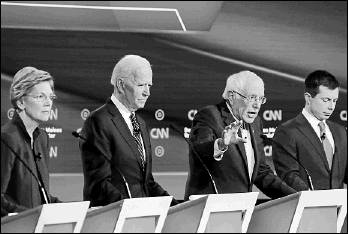‘Free’ higher education makes it less rewarding
This week, several Democratic front-runners confronted questions about their “free college” proposals, exposing a rift among the major candidates.
Sen. Elizabeth Warren, the former professor, was asked by a man if he would be reimbursed under her plan for the student loans he’d already paid off. Warren’s plan, like Sen. Bernie Sanders’, seeks to “cancel all student debt” — but not, by her own admittance, that which has already been paid back.
Meanwhile, Pete Buttigieg, the former mayor of a college town, was heckled by a group of protesters for being insufficiently generous with his proposal, which has an income ceiling in the six figures for families to qualify for “free” public higher education.
(The “free” will remain in quotes in my writing, by the way, because nothing in this world is free, and everything the government does is paid for by all of us.)
Buttigieg is right, and Sanders and Warren are wrong, that subsidizing college for every American family is a fundamentally elitist policy that would disproportionately help richer families. It would also drive up costs, as the last decades of massive government subsidy continue to feed the explosive growth of college administrators, of whom half a million have been added across campuses in the last three decades.
Sanders and Warren have justified their proposals by arguing that college is a necessity for all students. “Ms. Warren said higher education was a basic good,” reports the New York Times. No, it is not — that is why it is called higher education. It is the next level above K-12 education, which is indeed a public good provided by the state.
Which brings to the foray a glaring problem not being acknowledged among Democratic candidates: For many students, K-12 education in America just isn’t that good.
According to a 2017 Hechinger Report investigation, some half a million students across the nation are graduating from high school, which used to be their entry into the world, and are immediately funneled into remedial classes by institutions of higher education because they are not prepared for college curricula. The report classifies these students as “a financial drain on not only students, but also colleges and taxpayers.” This a tremendous indictment of the state of public K-12 education in America.
As I’ve written in these pages before, the same Democrats now proposing to massively subsidize college are loath to acknowledge our education system’s existing failures, since their party is a vassal to public-sector unions that oppose injecting options into our schools by way of school choice.
Another element missing in the debates over free college and forgiven student debt are the notions of value and hard work rather than cost and subsidy. There is an obvious principle, best encapsulated by psychiatrist and Holocaust survivor Viktor Frankl in his book Man’s Search for Meaning, that the greatest human accomplishment comes from striving, overcoming, and sacrificing toward a goal. It is this striving that gives higher education its value, and that politicians like Warren and Sanders are now undercutting in order to make things easy.
College is a luxury, not just due to the expense, but due to the opportunity cost of developing your mind instead of jumping into the workforce. It is not a necessity; it is a privilege, and you’re supposed to take it seriously.
And there are alternatives. High school graduates can work or go to trade schools like Williamson College of the Trades in Media, where they can graduate debt-free with a great-paying job. Our nation needs to wake up and relearn the value of such work. We have, frankly, too many commentators and not enough welders.
What voters should demand is a high school system that readily prepares students of all backgrounds for the world ahead, a trimming back of the state subsidies that enrich administrators and school endowments and impoverish everybody else, and a reframing of valuable work to include the trades.
And if you won’t accept the words of this lowly writer, take to heart those of the great English revolutionary and adopted son of Philadelphia, Thomas Paine: “That which we obtain too easily, we esteem too lightly. It is dearness only which gives everything its value.”
Making things easy doesn’t make them intrinsically rewarding; precisely the opposite is true. Higher education should remain a value, and for that, people will continue to have to pay.
Albert Eisenberg is a Philadelphia-based political consultant. He formerly served as the communications director for the Philadelphia Republican Party and is a founder of Broad + Liberty.albert.eisenberg@gmail.com albydelphia

